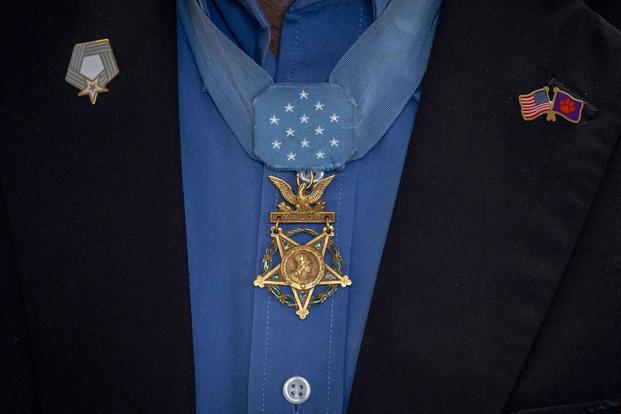Uncovering when people are lying about their military service could be harder under a proposal in Congress to restrict public access to some military records, researchers of stolen valor and military history say.
At issue is a provision included in the House Appropriations Committee's draft 2024 Pentagon spending bill that would bar the military from releasing basic details about someone's service record without that person's consent.
"It is a horrible idea," said Doug Sterner, who curates a database of Medal of Honor recipients and championed a law that makes stolen valor a federal crime if it's for profit. "It's a horrible idea, and it flies in the face of the true history of the men and women that preserved this great nation."
Read Next: A-10s Were Saved from Retirement for Years. Congress May Not Swoop to the Rescue This Time.
Right now, researchers, journalists and other members of the public can quickly ask the military services for some basic information about a service member's record without filing a formal public records request that could take months or years to process. Releasable information typically includes name, rank, past and present duty assignments, awards and decorations, among other details.
Under the proposed defense spending bill, a current or former service member, or their next of kin if they are dead, would have to consent to releasing that information.
If the service member or their family does not consent, members of the public would have to file a formal Freedom of Information Act request to obtain the service information. But the service member or their family would still have to be notified of the request, potentially adding even more time to the infamously slow FOIA process.
The House Appropriations Committee often includes partisan policy riders in initial drafts of its bills that have little chance of becoming law. The Appropriations Committee's defense panel has advanced this year's Pentagon spending bill, but the measure still needs approval from the full committee and full House, as well as to survive negotiations with the Senate.
A committee aide told Military.com the provision "was in response to the unauthorized disclosure of military service records."
"Nothing in the provision prevents the public from obtaining the information for stolen valor. It simply requires them to go through the FOIA process," the aide said. "At the end of the day, this is about balancing the privacy of our service members and veterans with the public's access to information within existing law."
The legislation comes after Republicans fumed that the Air Force improperly released personal information of several veterans running for Congress in the 2022 elections. The released records included an Air Force veteran whose record detailed her alleged sexual assault, as well as records for two sitting congressmen.
In those cases, an opposition researcher with ties to the Democratic Party allegedly requested service records using what's known as a Standard Form 180. That form can request more detailed and personal information than what is typically released publicly, but the service member or their next of kin has to provide written consent to release the records. The Air Force has acknowledged that it did not follow proper procedure in releasing the records.
"They're punishing everybody for somebody not following the law," Mary Schantag, chair of the POW Network and a historian who verifies accusations of stolen valor, said of the proposal in the defense spending bill.
In the 2022 election, journalists used the process being targeted by the appropriations bill to uncover that J.R. Majewski, a Republican congressional candidate in Ohio, inflated his military record.
Journalists and researchers frequently ask the military services to quickly verify that veterans in the news indeed served. In recent years, researchers focused on extremism have also sought to verify military service of accused extremists.
Schantag said she is contacted every day of the year by people wanting to confirm someone's service record. Right now, she has more than 300 open cases, she added.
"I don't know how we will prove somebody is a liar anymore," she said of what will happen if the bill becomes law. "This is not a small, minute, minimal problem. This is an epidemic. And these guys know, they know they're gonna get away with it."
In addition to confirming stolen valor, Sterner said several other reasons people request military records could be stifled by the proposal.
Specifically, he said he was concerned about his work discovering lost histories of veterans too modest to discuss their heroism, as well as his wife's work housing homeless veterans. While the homeless veterans may give their consent to verify their military service, he said, that could add bureaucratic hurdles that delay an urgent need.
"What we're requesting is not personal information. It's public information," Sterner said. "There is no common sense to this. What is there to be afraid of by the information that is public record? There is no personal information there. It's a totally stupid idea."
-- Rebecca Kheel can be reached at rebecca.kheel@military.com. Follow her on Twitter @reporterkheel.
Related: Military Stolen Valor Cases on the Rise, Investigators Say














